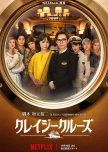
The show is quite stagey: the major moments of this drama occur when two to four of the main characters are in a room together talking through their issues. I recommend watching through Ep. 8 (the fourth hour) if you wish to test this show out. If Bae Doo Nah's performance in the final scene of that episode does not move you, then this show is not for you.
The characters, performances and writing are uniformly superb throughout this drama. Even though all the characters are pretty difficult people, there are plenty of comedic moments to keep this drama from being a dire examination of failing marriages. There are plenty of surprises along the way, and many happy and light moments in addition to the more hurtful consequences of the failing relationships.
In the end, I preferred this version to the original. Sakamoto's script is more comedic, but Moon Jungmin's additions and changes to the story all tended to clarify and enhance the themes of the original. Furthermore, the supporting cast is definitely better in the Korean version. Moon Sook is radiantly beautiful and luminously wise in the role as the grandmother. And there are a couple of lovely romances going on with the side characters that help provide relief to the two main stories.
Matrimonial Chaos is a sharply observed investigation into the ways that people in relationship can get in the way of each other's happiness. It's a beautiful story of people learning to see each other for the first time all over again. It does not rest on the usual tropes of marriage as a happily-ever-after, but, instead, finds deep wisdom in the ways people still find to like each and learn to be for each other even when it's not easy to do so.
It is great. You should watch it.
Was this review helpful to you?

Nevertheless, she is still well liked enough to get fairly steady work for national advertising campaigns and has launched a music career as a singer/song-writer and guitarist. And, obviously, someone liked her enough to invest in her for this movie for YouTube Originals that she wrote, directed, starred in, did the costumes for, art directed and edited. That someone also paid for an accompanying documentary series on the making of the movie called "I AM NON".
And so what we have here is, essentially, a student film shot on a thirteen day shooting schedule with a professional crew led by a wildly creative young woman who has, apparently, never heard of these strange things called film schools. Given all of the above saying anything bad about this film would be like punching a kitten.
It is a fairly simple story of a high school senior trying to understand why her grandmother has left the household and also trying to figure out what to do with her life while being tempted by and distracted by the forest spirits (yokai) around her. There are no real surprises here, and the editing would probably be tighter in more experienced hands. However, Non does have a strong visual sense as a director and is a charming actress. The story has Ghibli-esque aspirations and largely succeeds at evoking the wonder of a young woman discovering her power as an artist (both within the story and outside via the making of the film).
Was this review helpful to you?

The titular Sakura is played by Takahata Mitsuki in a rigorously disciplined and idiosyncratic performance which is similar in some ways to that of her Sachiko in Boukyaku no Sachiko, but here the script takes her character much more seriously, and she is allowed to go much deeper. I am no expert in neurological classifications, but Sakura appears to be autistic, rarely smiling and unrelentingly honest for which the large construction firm which hires her repeatedly punishes with demotions and transfers.
The episodes themselves are highly structured. Each tells a story in Sakura's corporate life from ten successive years told by her co-worker friends to her while she is in a coma in 2019. Through repeated encounters and motifs in each episode we learn about how she became their friends and the positive impact she has had on their lives.
The series is unquestionably good through episode 9 where the episodic structure is intentionally broken, and there is a very interesting tension well into episode 10 of whether the show can actually stick the landing without betraying the spirit of its characters. Surprisingly, it does so. A bit unrealistically and conveniently, perhaps, but the show does remain true to Sakura's character while providing a satisfying, if a bit pat, ending to the series.
In the end, the series makes a fairly clear case that the company would be better were it more open to Sakura's way of seeing the world. The story talks about corporate power and intention, and provides an interesting though probably simplistic view of what the source of that power and intention should be. Sakura comes to her company with a dream of building structures with her friends that will make the world a better place, and ends with her having helped those friends define their own dreams. They become more Sakura-like, and she becomes more empowered by their increased authenticity.
It's worth checking out.
Was this review helpful to you?

A charming and delightful film based on a manga and about manga
BL Metamorphosis is the story of Urara and Yuki (Sunshine and Snow) who build a cross-generational friendship based on their mutual enjoyment of BL manga. Urara (Ashida Mana) is in her second to last year of high school and facing the choice of what college programs to apply for next year. She's working at a local bookstore when a recently widowed calligraphy teacher Yuki (Miyamoto Nobuko) wanders in to escape the summer heat and a finds a popular BL which catches her eye. Urara is an embarrassed secret fan of the genre, and Yuki had no idea such a thing existed but quickly finds that she loves it and seeks out Urara's advice to learn more about it and get her recommendations.Acting is reacting, and, as ever, Ashida's reactions are on point, expressing all the embarrassment and social awkwardness of a young woman who has not found herself yet. Yes, she has a crush. But he's already dating the tall, popular, beautiful Eri, and what would happen if he or, worse, THEY ever found out she's into BL? Nevertheless, Urara guides Yuki into the world of BL fandom, and Yuki encourages Urara to try making a manga of her own.
The film is quite smart with lovely parallels drawn between the manga that the two are reading, and the other things happening in their lives. The score and song choices help to propel the story along and as whole the film feels much shorter than its two hour runtime.
It is, indeed, rare for a film to center on a friendship between two people with an age difference of over 60 years, and this film does so lovingly and well. Ashida, if she chooses to, will be Japan's breakout star in the coming years and Miyamoto is a good solid veteran actor. Together their scene work provides all the warm-fuzzies you could want.
Was this review helpful to you?

A fabulous melodrama
By the end of the first episode a premise is established, and you might wonder why one would want to watch this show if they are going to stick to this premise to the bitter end. Well, they do stick to the premise all the way, but mange to stick the landing about as well as one could hope. Along the way there are a couple of surprises that are also quite moving, and there are good, uplifting themes that provide warmth and light in what otherwise would make for a pretty dire story arc.It is the story of a boy named Sun (Taiyo) and a girl named Rain (Ame) who fall in love in high school and promise to meet again once they achieve their respective dreams. Eight years later Ame returns to town and neither of their aspirations have been fulfilled. It is a story of sacrifice and love for the pair at the center of the story and for their families. Over the course of the series they have to face an unquestionably terrible fate in their near future mediated by two mysterious supernatural beings who have been chosen by the heavens to witness the story as it unfolds.
It does end up being a bit of a crying contest between Yamada Yuki (Taiyo) and Nagano Mei (Ame). I prefer Nagano as a comedian, but she can cry on cue apparently effortlessly, and so she often gets booked for these kind of roles. Here she manages to bring her bright personality and charm to the character which goes a long way to preventing this series from being the emotional slogfest that you might expect it to be given the premise. Yamada has the more stoic role to fulfill, and he does match Nagano tear for tear in the scenes that call for it. The pair have a solid chemistry together, and they have a nice romantic arc, but that romance pretty much has to be sexless because of the set up.
It bears mentioning that the series is beautifully shot with consistently excellent blocking and composition. They have chosen a color grading that makes almost all of the daytime shots feel like golden hour which also helps to keep the series from feeling dire and grey.
If you like melodramas, and want a good cry, then this series is probably exactly what you're looking for. I tend to avoid melodramas as a genre and tend to think that they can be emotionally manipulative for little payoff other than the tears. And so I was pleasantly surprised that this series had a bit more depth than merely saying "life sucks and then you die". And so I'd say the series is also well worth the watch for anyone looking for a nice little fable about love and pinky-swears.
Was this review helpful to you?

Hanbun, Aoi was the summer asadora in 2018, and tells the story of Suzume from birth through the age of 40. As a typical NHK asadora the production, cast and direction are all of the usual high quality. However, the show is an exemplar of bad top-down writing in which certain check-points have to be hit for the protagonist in the desired narrative, and as a result there are some unbelievably stupid plot points along the way. I think the series is meant to be a fabulous tale of a young woman overcoming some personal adversities to find the love and happiness that she was fated to find. The title "Half Blue" is meant to be interpreted as a "the glass is half-full" kind of optimism in the face of challenges, but, ultimately, the story pretty much continuously beats down the protagonist, ignores any of her achievements and acquisition of skills along the way, and reaches a markedly tepid finale (The marginally interesting thing they were working on goes into production and the preordained OTP finally hug. Yay?)
The first third of the story is reasonably interesting. Suzume loses the hearing in her left ear at 8 from an otherwise asymptomatic cases of the mumps. She is supported by her family and friends and adapts to her disability. Suzume is not particularly bright, but does have some talent at drawing and illustration and so she decides to pursue a dream of becoming a mangaka. She becomes one of three proteges of a very successful mangaka, and the characters throughout this section and the challenges they face as artists are all pretty interesting and fun.
The brief middle section middle section which is meant to transition the character from a working mangaka to a single mom is pretty much utter tripe. Events which normally would be signs of success are interpreted as disasters. Plot threads about finances are brought up and then blatantly ignored over a couple of large time jumps, and the marriage ends pretty much as it began: because the writer says so, Nothing in this section makes much sense.
The last half of the series is focused on Suzume becoming a maker where you might expect the skills she developed as a mangaka to come in handy and help her thrive. But, no. The story pretty much continues to beat her down, and we are left with a very mild will-they/won't-they plot that lurches over an arbitrary finish line slightly beyond the Tohoku earthquake.
The cast is good, however, and Nagano Mei capably carries the show, such as it is. The character cries fairly frequently and the actress seems to get there effortlessly. Suzume is a little blunt and a little oblivious, and Nagano's charm makes the character quite likable. Like most asadora there is a large ensemble cast surrounding her with an interesting range of characters with their own dreams and aspirations.
Top down writing is not necessarily bad. Sakamoto Yuji's 2016 Love That Makes You Cry (https://mydramalist.com/16024-love-that-makes-you-cry) covers much the same territory, planting the Tohoku quake in the exact middle of the series and ending on the OTP's first kiss. But even then, it's not his best work, and comes off as more of a writer's exercise than one of his more organic tales. In contrast, the blatant structuring of the story makes Hanbun, Aoi even less interesting because the predictable ending is predictable and the machinations to get the characters where the outline put them frequently seem arbitrary and contrived.
Was this review helpful to you?

Nigeru wa Haji da ga Yaku ni Tatsu: Ganbare Jinrui! Shinshun Special!!
12 people found this review helpful
A Delightful Pregnancy/New Parent Story
This is a follow-up special to the excellent 2016 J-Drama Nigeru wa Haji da ga Yaku ni Tatsu and if you enjoyed that series, then this special is absolutely a must-see. The film is a tad didactic about pregnancy and new parenthood, but I think that even people who have not seen the original series can enjoy it as a standalone movie.The special continues roughly three years after the end of the series. Mikuri and HIramasu are now happily and genuinely (if not legally) married, and working hard at their jobs. Mukuri's Aunt Yuri has broken up with Ryota, and facing her prospects as a successful business woman with no life partner.
The story largely focusses on Mikuri and Hiramasu as they discover that a child is on its way, and have to deal with the usual issues of first-time parents in Japan which are complicated by the birth occurring immediately before the first Covid lockdown in Japan. The show deftly addresses the systemic resistance to the legally mandated parental leave by Japanese businesses, and places the two on the front lines of trying to change the work culture to reasonably accommodate pregnancy.
Most of the side characters return for the special, and the series continues to be unusually LGBTQ+ positive in comparison to most J-dramas. Hiramasu's gay previous boss Numata is now living with the guy he met in the final episode and there are a couple of other good solid moments of inclusion as well.
All in all, this special is a happy story about a young couple facing the challenges of pregnancy and new parenthood. It is a test for their relationship, but it is one that they work together to face, and in the end they have a loving, growing family in the new normals of life in Covid times and the acceptance of LGBTQ+ relationships.
Was this review helpful to you?

A Pandemic Dividend
What do you do when your country goes into lock-down, and normal TV productions are halted for a few weeks? How about grabbing one of the greatest living screen-writers in Japan, and rush out four short stories that can be filmed in the actor's homes?Apparently on a tight deadline, Sakamoto-sensei includes a self-insert character who needs to get a series of scripts out the door. The writer played by Abe Sadao is going a bit wonky from isolation, and has a defensive relation to an acorn as he tries to grapple with the inherent worth of humanity, as one does. His segments serve as the wrapper for all four short stories.
All the stories are set in sort of parallel universes to now. The first deals with a modern species of Neanderthals facing their probable extinction to Homo Sapiens. The second has two brothers sharing the making of a meal before a divided Japan begins a civil war with the two on opposite sides. The third is a charming tale of a guy trying to salvage his relationship by using a magic spell which resets the mind of his girl friend back a couple of minutes. And the final episode has a TV producer grappling with the decision to air a program which could get him fired while he confronts an incident in his past.
I found three of the episodes delightful, and all of the performances are quite good. The series is short, and more Sakamoto writing is always a good thing.
Was this review helpful to you?

Interesting film. Not sure it worked.
After skewering the tropes and conventions of mysteries in last summer's series, Hatsukoi no Akuma, it's clear that Sakamoto understands the genre and could have written a satisfying, bog standard mystery set on a cruise ship. But, instead, he seems to have chosen not to, and it makes me wonder why.Our intrepid, ersatz detectives are Ubukata and Banjuku who have a meet-cute as the cruise ship is leaving the dock in Hokaido for a 45 day cruise to the Aegean and back. Banjuku is trying to track down the woman she suspects of cheating with her boyfriend and who happens to be Ubukata's girlfriend, and somehow ends up on board with no ticket and no luggage but manages to have a week's worth of fashionable wardrobe to wear throughout the film. There are TONS of little details in the film like that which make no sense at all. None of them are insurmountable, but the filmmakers do not even seem to care. And so do not come to this film expecting to find a tightly woven thriller where every detail was intentional and counts towards the "solution" to the mystery.
But does it work as a romcom instead? Eh... There is SOME chemistry between the two leads, and Ubukata has some character growth, but Banjuku is just sort of an MPDG tugging that growth along, and we really do not get much a backstory and motivation for her other than her suspecting her boyfriend of cheating.
And so it's not much of a mystery and not much of romcom? Is there anything here to salvage the film? Well, you know: it's Sakamoto, and he generally does have things to say. (See, for instance, my coverage of his oeuvre through 2021 here on MDL: https://mydramalist.com/article/a-watcher-s-guide-to-the-series-of-sakamoto-yuji)
In this film, he touches a bit on classism and the divide between the haves and the have-nots who serve them, and, as usual, he questions the reductivism of eat-the-rich, and, while he does condemn all rudeness and abuse, he weaves a bit of complexity into that dichotomy by focusing on the resulting relationships and how they can bridge the gap between social classes.
He also considers at length the importance of people's intentions over their actions. Does it matter if someone intended to cheat, but did not in fact do so? Does it matter if someone intended to murder, but did not in fact do so? I do think Sakamoto intends to say yes and always. But I'm not sure that thesis is enough to bring this film up to his usual standard.
If you're looking for what Sakamoto has to say about mysteries go seek out Hatsukoi no Akuma: it's fun, and the acting is off the charts in that last episode. If you're looking for his views on romance, I'd probably go with Saikou no Rikon even though it's explicitly set after the bloom has come off the rose.
Was this review helpful to you?

What happens to Raise de wa Chanto Shimasu when it drops most of the sex?
If you are reading this review, then you most likely know the deal with RdwCS: it's the sex-positive show that over two prior series and a special explored the love lives of a small company of five young CG artists making animations for TV and film. As ever, the third season affirms a broad spectrum of sexual identities and sexual interests (and non-interests). However, if you've enjoyed the prior series, you might be upset to learn that they've taken our favorite PG-rated sex comedy and produced a season where there is very little if any sex happening. The surprising and fun thing is that doing so has resulted in the best season yet.There was nothing puritanical about the change in focus for this season: the series retains the same sex-positive tone of the earlier seasons. However, in exchange for the antic sex scenario introductions of the prior series, this season instead goes deeper into the emotional lives of the characters (yes, even Masaru), It fleshes out the back story of Momoe and Ken, but also gives nice arcs to Masaru, Toru and Ume. There are probably as many laughs this season but now also some tears, and the emotional canvass is broader in other ways as well. The show has, surprisingly, grown up just a bit.
The episode structure remains the same with each 30 minute episode divided into two vignettes featuring at least one of the principal characters, and the show continues to resolutely avoid trying to say much of import. Nevertheless, if you have enjoyed the prior seasons, it is quite likely that you will enjoy this season even more. (You need only glance at the comment section here for confirmation).
Was this review helpful to you?

This series of the show takes a while to reach the form of the later series. Initially, there was only one host, YOU. She was joined by Reina Triendl in episode 14, and four more panelists join in episode 27 including Hiroomi Tosaka, a member of the band Sandaime J Soulbrothers and the only panelist who did not return for the Netflix revivals. If you like the Netflix series, you might be tempted to skip the earlier episodes; however, doing so would cause you to miss several iconic moments and the introduction of key house members who play important roles in the peak episodes of this series.
Another important difference between this series and the subsequent series is that the time between filming and broadcast was initially an astonishingly short one week(!). That is, because the housemates can and do watch the show on the show, they could see what their housemates had said when they were not in the room from the week before. This fact only really has a impact two or three times over the course of the series, and the length of the lag slowly increased so by the end there was a three week gap between filming and broadcast. Nevertheless, if you ever imagined what a reality series would be like if the participants could immediately see how they were portrayed, then this is the show for you.
In general, the Boys x Girls Next Door typical episode is about the same in quality to episodes of the later series: you still have the amazing cinematography that never has a camera or mic pack in shot, you still have the slowly developing relationships and romances, and you still have the comedy relief and empathy of the panel who break in to provide context and color - but do note that unlike later series, there is often a panel segment after the closing door sound. However, the peaks of this series are higher than those of subsequent seasons. There are events which unfold which could not have been scripted which are likely to touch you more than anything which has happened in the subsequent seasons. You are likely to laugh harder, cry more, and have your heart lifted higher by a romantic connection than in any subsequent season to date.
Was this review helpful to you?

Wow, stunningly bad writing to the bitter end
If you wish to see some of the best actors in Japan acting the hell of some o f the shittiest scripts you will ever see, then this is the show for you.For most of its run its meant to be a light murder of the week mystery show, and you might find maybe the first 7 episodes endearing as such; however, even there most of the scenarios and "solutions" to the mysteries happen because the writer says so and not particularly because he planted clues that would result in the kind of satisfactory resolution that is de rigueur in these kind of shows. And ALL of the recurring characters are idiots accept Anna (Hirose Suzu) and a friend, Tomori (Hashimoto Kanna), she makes early on. Almost all of the rest of the characters are played pretty much as comedic buffoons. I mean, maybe Maki Yoko's Mizuho and Tomita Miu's Kaoru are not buffoons, but SOMEONE has to provide the the exposition and deus ex machina that the wretched writer has to rely on to progress the plots such as they are. Even the head of the detective agency played by the legendary star, Eguchi Yosuke, who is supposed to be this retired master detective never actually solves anything throughout the series and only exists to do some tepid fight scenes which are meant to bring some action to the series but only occur because the writer wanted there to be a fight scene at that point in the script.
The tone of the series arc which is hinted at in all the all episodes and resolved in the final episodes entirely contradicts the lighter tone of the earlier episodes, and nothing about that arc makes sense. Things like Anna being set up throughout the series as a genetically modified supergenius are entirely ignored by the writer in the (anti)climactic final episodes mostly because he only has a passing acquaintance with intelligence himself.
I'd say skip this series even if you are a stan of the greats like Hirose, Eguchi and Maki and the goods like Arashi's Sakurai Sho,
Was this review helpful to you?

I am not a K-pop or J-pop fan, and so my review should be fairly free of any emotional investment in those scenes.
Produce 48 is the third Korean installment of a musical survival show produced by Mnet. The prior two seasons resulted in a successful debut of a girl-group and boy-group respectively. What made this particular iteration of the series more interesting from a global perspective was its collaboration with AKS, the parent company responsible for developing AKB48 in Japan and turning it into a wildly successful music group franchising organization. The initial plan was to do a version of the show in which half of the contestants were Korean trainees and half were Japanese idols from the various 48 groups.
That's not quite what we got. Produce 48 initially started with 39 Japanese Idols and 59 Korean trainees, and the show chose not to or was not able to allow people to vote outside of Korea. And so the contest was never particularly structured to be fair for the Japanese contestants.
The early episodes of the series are a quite interesting look at the differences in approach to artistic development and growth between the two systems. In short, the Japanese idols are shocking less well trained at singing and dance in comparison to the Korean trainees in their agency system. Now, that could be a bias of the presentation on this show; however, it's fairly well documented outside the show that the girls in the 48 groups are not, in general, provided with any kind of training while agencies in Korea can invest years of training into performers before their debut (and exact huge debts for from the performers for doing so, but that's a whole other discussion). What the Japanese idols do acquire from AKS is a wealth of stage and general entertainment experience.
Generally, the structure of the show is a couple episodes of the contestants preparing and then performing a song, and then an elimination episode where roughly a third of the current pool is eliminated until at the end of episode 12 we're left with a group of 12 performers to be known as IZONE. Voting for the contestants often begins weeks before a performance is shown, and so much of the fate of individuals is based on how much screen time they've managed to get and how well they present on camera rather than their ability to sing, dance or rap which is ostensibly are the skills upon which they are supposed to be judged. All survival shows are popularity contests, and Produce 48 is no different in that respect, but it's clear that the way the voting on Produce 48 is structured does not particularly serve to select the best performers which might be okay as long as you understand that fact.
The performances throughout this series were uniformly outstanding, but subject to the usual quirks of Korean editing where any notable moment good or bad is repeated immediately two or three times. Were the show more focused on the performances, it would be far better. The training segments are okay and the training staff are generally charismatic and professional. But there's also a lot of fluff around group selection for the performances, inevitable product placement segments and utterly crap and banal game segments that only serve to juice the votes for whomever makes the cut in the final edit. The host, Lee Seung Gi, does an excellent job until the final live episode where he could use a teleprompter and some training to get his head out of the cards in his hand.
In conclusion, Produce 48 was an intriguing cross-national premise that was poorly served by the game structure and production decisions. It was not a unmitigated disaster, and, indeed, resulted in some quality musical performances. However, it did certainly fail to live up to its hype, and it did fail to create a level playing field for the two groups involved. I enjoyed watching it, but it could have been much better with some fairly obvious structural changes.
Was this review helpful to you?

Why are you reading this review? Just go watch it: it's great.
It's a story about the power of hate.Or, rather, it's a story about the power of ha-te (はて), an interjection in Japanese meaning "Hmm..." or "Let me think about that...".
It's the catch-phrase of Tomoko also known as Tora-chan who is a fictionalized version of Mibuchi Yoshiko, one of the first women to pass the Japanese equivalent of the bar (three women passed at the same time) in 1938. She later became the first woman judge in Japan. Tora-chan was, thus, a lawyer in Japan before women had the right to vote, and so, in part, the series is about First Wave feminism in Japan although it touches on many other social issues as well including the wars, the judicial and legislative response to the use of nuclear weapons in Hiroshima and Nagasaki, prejudice against Koreans, the conflict between rehabilitative and retributive justice, and even conditions for LGBTQIA+ people in Japan during the span covered by the series.
Ito Sairi plays Tora-chan throughout the series from age 17 through her 60s in a role demanding a huge range from comedic to tragic to romantic to analytic but always, always, always empathetic. Ito's Tora-chan is smart (of course), routinely questioning the assumptions and presuppositions of the laws of the time but those of the broader society as well. However, she is also light-hearted and energetic. She occasionally makes mistakes, but invariably tries to listen to and learn from everyone around her even when she is the sole judge in a case. She is that same Tora-chan both at the bench and at home. The cliche is that "acting is reacting". Ito's reactions are *frequently* priceless throughout the series.
Accompanying Tora-chan along the way are the four other women in her class at law school and the women around those five who support them. They form an informal consciousness-raising collective that spans the series. They include Tora-chan's high school bestie, Hanae; a noble woman from a wealthy family, Kyoko; her servant, Tama; a Korean student, Hyang-suk; a woman fighting for the custody of her younger sons in a marriage which is falling apart, Umeko; and masc Yone. The series is not particularly a court procedural though a case or two is usually the b- or c-plot for each week. Instead, the lives of this set of classmates and friends more frequently form the basis for the main plot each week and which introduce the societal issues the series addresses.
Also, there are some men in the series.
Okay: that's a joke. Tora-chan has a couple of cishet romances and a lot of mentors who were instrumental in the formation of the post-war judiciary under the new constitution in Japan. In fact, some of the male actors give some of the best performances of the series, and I must particularly shout out Matsuyama Kenichi as Katsuraba in a surprisingly interesting role as a powerful if dyspeptic member of the judiciary who was at the center of the formation of the justice system in a tumultuous and transformative time in Japan's modern history.
The series was written by Yoshida Erika who at this point is probably best known for her award-winning anime adaptation of Botchi The Rock! But you can probably get a better sense of the kinds of issues she likes to explore in her great aro/ace live-action drama from 2022, Koisenu Futari. Any asadora is a challenge for a writer for its length, if nothing else, and the fictionalized biographies like Tora ni Tsubasa are particularly challenging since they should be true to what is known about the historical, real person while also being interesting throughout and while still covering the better part of that person's lifetime which are typically not uniformly dramatic. Yoshida triumphs against that challenge, and Tora ni Tsubasa is a fucking tour de force.
Ha-te. Let us pause to consider. The back-bone of this series is Article 14 of the Japanese Constitution of 1947: "All of the people are equal under the law and there shall be no discrimination in political, economic or social relations because of race, creed, sex, social status or family origin." What does equal under the law mean? How do the instruments of justice assist in the formation and regulation of a society? How should a judiciary live up to the ideals encoded in any constitution let alone one unilaterally bequeathed by a foreign occupier?
Faced with an unprecedented number of orphans after the war who frequently had to beg and steal to survive, one of Tora-chan's mentors, Takigawa, posits that the approach of the family courts being created to address such cases should be based on love - that the judges even in criminal cases in juvenal court should listen and strive to find the best ways to bring the strays back into the fold using whatever resources the country is able to supply at the time. And that form of being open to the possibilities of what individuals want and need, that form of love, permeates this series. Tora-chan was blessed with parents who were open to possibilities for her beyond the arranged marriage that they tried to provide for her, and she in turn is open to a similarly broad range of possibilities for her family and those whose cases she must address.
Tora-chan listens, thinks and loves. In doing so she mostly makes the lives better for the people around her. But Tora ni Tsubasa is not a hagiography. Ito's Tora-chan is never comfortable being a first. She's just a judge trying support an approach to her country's constitution which lives up to its ideals knowing full well that no judicial system can do so perfectly. She is far less interested in being a role model than in helping her family, friends and her society in general. Tora ni Tsubasa makes the case that, ultimately, that power of pausing and considering is the bedrock for Tora-chan's ability - indeed, for each of us, our own ability - to care.
It's a story about the power of love.
Was this review helpful to you?

A Time-Travel Musical About Cultural Change
It's no Crazy Ex-Girlfriend, and it's no Back To Future. But Extremely Inappropriate is, indeed, a weekly musical involving a very limited form of time travel. Written by the extremely well-lauded Kankuro Kudo, the series grapples with current social hypersensitivity and conformity which has been intensified in at least some cases by social media. The initial impression of the series is that it's positing the idea that people back in the good old days (1986) would be able to cut through all the woke bullshit and restore some kind of social sanity to the ridiculous limitations imposed of today (2024) by SJWs and their ilk in business and entertainment media. But that position is a bit of strawman that Kankuro attempts to pull apart in the course of the series.And so takes he the most obliviously sexist and abusive archetype he can think of, a high school PE teacher from 1986 (Ogawa Ichiro played by Abe Sadawo) and has him get on a bus to 2024. Simultaneously, a feminist sociologist (Sakae played by Yoshida Yoh) and her teenaged son (Kiyoshi played by Sakamoto Manato) are brought on the same bus from 2024 to 1986. Hijinks ensue in both time periods as the bus runs its route on Saturdays.
In 2024, Ogawa immediately falls upward in the business world by saying things that cannot be said in the current culture and ends up as the counselor in the standards and practices department of a large broadcast television network which allows the series to address various forms of social policing across the episodes. Meanwhile, Sakae and Kiyoshi are confronted by the old-school sexism and systemic repressions of 1986 while living with Ogama's daughter Junko (played by Kawai Yuumi).
If you are put off by musicals, you might still find this series tolerable. Each episode does contain singing and usually a production number, but they last no more than maybe 3 to 5 minutes of the total runtime of the episode. The songs are not terribly memorable, and, indeed, pale in comparison to the maybe two songs in Kankuro's asadora Amachan from 2013. However, the entire cast are surprisingly good singers and seem to relish their chance to use that skillset in this series. I genuinely recommend Abe's turn as a heavy metal singer in the 2018 film Louder!: Can't Hear What You're Singin', Wimp if you find you enjoy his singing as Ogawa in this series.
The time travel here is no more than a narrative device, and there really is no intention to explore paradox or establish any of the usual variants of timelines and their consequences. A handwavy shock occurs between characters if they are about to do something will cause a change in the timeline (except what it really prevents in the one instance that it happens is something else entirely that really does not involve a potential paradox). Characters go back and forth between the two eras in a completely chronological order mostly to see the differences in the culture that have occurred in that 38 years.
And so if it's not a great musical and it's not a great time travel story, why watch this series? The answer is: for the characters. Ogawa has a lovely shift in attitudes and understanding through his adventures in his future. His daughter Junko sees a world of possibility open up for herself when she sees the way the culture will change. The widowed Oagawa's love interest in the future, Nagisa (played by Naka Riisa), learns more about herself and her family. There are a lot of interesting and fun side characters as well as is usual in Kankuro's work including a self-insert of a television writer in a couple of the episodes.
I'm pretty sure the social critique did not work as well as intended, but I did grow to love these characters. I particularly liked Kawai's Junko though it's Naka's Nagisa that gets to do the heavy lifting in the series which she does with a deft comedic flare.
The final song of the series is a plea for tolerance, but, honestly, Kankuro's comedic study of guilt, atonement and forgiveness Saving My Stupid Youth (also currently on Netflix) from 2014 is much more insightful. I rate that and his Story Of My Family from 2021 (and also on Netflix) a bit higher than this series, but I do think this series is still well worth the watch.
Was this review helpful to you?






















